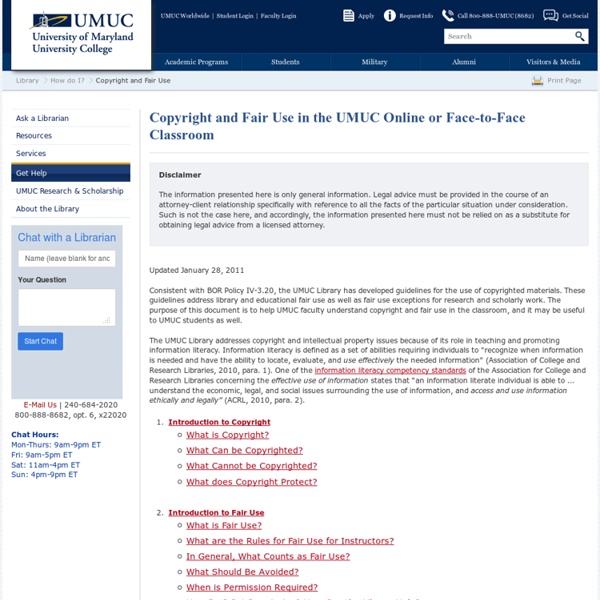WebQuest
Overview | Materials | Workshop Hotlist | Workshop Outline | Additional Resources | Standards | Credits & Thanks Overview This one-hour workshop is intended to give high school students: an introduction to the issue of plagiarism, an overview of copyright laws and fair use provisions a demonstration of techniques to avoid plagiarism, focusing on paraphrasing, quoting, and citing sources. Presented here as an outline, this workshop can be expanded or contracted to meet time constraints, and student interest, concern, or grade level. Materials Needed Workshop Hotlist Bookmark the Internet sites to be accessed in advance or project this hotlist during the workshop itself. I. II. III. IV. V. VI. Workshop Outline I. Copyright Lesson Plan by Laura Kaemming This online lesson plan was designed for 8th grade students to be implemented over the course of several days. Copyright Worksheet Distribute worksheet to students as they enter. II. Project the website. III.
Fair use guidelines for educational multimedia
Fair use guidelines for educational multimedia These guidelines were developed during the CONFU process. For a full explanation of their status, see Confu: The conference on fair use. 1. Introduction 2. 3. 4. 5. 6. Appendix A: Organizations Endorsing These Guidelines Appendix B: Organizations Participating in Development of These Guidelines 1.1 Preamble Fair use is a legal principle that defines the limitations on the exclusive rights** of copyright holders. There is no simple test to determine what is fair use. While only the courts can authoritatively determine whether a particular use is fair use, these guidelines represent the participants'**** consensus of conditions under which fair use should generally apply and examples of when permission is required. The limitations and conditions set forth in these guidelines do not apply to works in the public domain--such as U.S. **See Section 106 of the Copyright Act. ***The Copyright Act of 1976, as amended, is codified at 17 U.S.C.
Plagiarism: How to Avoid It
Avoiding Plagiarism According to the definition given in the 1997 New Webster's Encyclopedic Dictionary of the English Language , plagiarism is "the unauthorized use of the language and thoughts of another author and the representation of them as one's own" (508). To avoid plagiarism, all students must document sources properly using Footnotes, Endnotes, or Parenthetical References, and must write a Bibliography, References, or Works Cited page and place it at the end of the research paper to list the sources used. Of the three ways to document sources - Footnotes, Endnotes, and Parenthetical References, the simplest is using Parenthetical References, sometimes referred to as Parenthetical Documentation or Parenthetical Citations. Check to see which type of documentation is preferred by your teacher. Do not be tempted to get someone else to write your research paper, hand in the same essay to two or more different teachers, or purchase instant essays from the Web. º Avoiding Plagiarism .
The Code of Best Practices in Fair Use for Media Literacy Education
Click here to view or download a PDF of this report. Coordinated by: The Media Education Lab,Temple UniversityThe Program on Information Justice and Intellectual Property,American University Washington College of LawThe Center for Media & Social Impact,American University With funding from: The John D. and Catherine T. MacArthur Foundation And additional support from: The Ford Foundation,by way of the Future of Public Media Project Introduction Principles of Fair Use in Media Literacy Education 1. 2. 3. 4. 5. Conclusion Common Myths About Fair Use Notes What This Is This document is a code of best practices that helps educators using media literacy concepts and techniques to interpret the copyright doctrine of fair use. What This Isn't This code of best practices does not tell you the limits of fair use rights. It’s not a guide to using material that people give the public permission to use, such as works covered by Creative Commons licenses. How This Document Was Created Media Literacy Education
Privacy Policy
Privacy Statement Harvard Business School understands that the privacy of its users is important. To that end, we have adopted the following policy with regard to the collection, use, and dissemination of personal information requested from visitors to this site. Personal information is information associated with a user's name or personal identity. We are providing this policy below so that you may understand the terms and conditions associated with the provision of any personal information to us. Please note, however, that this policy has been developed with the recognition that Internet technologies continue to develop and evolve rapidly, and that such changes may require us to alter our Privacy Policy. General Statement You may visit our website without identifying yourself or revealing any personal information. Personal Information Collected and Use of Information We do not intentionally collect personally identifiable information about children age 13 or younger. Cookies



